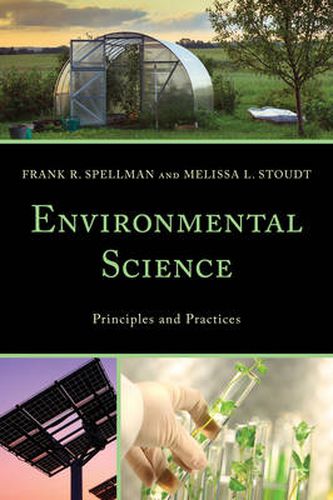Readings Newsletter
Become a Readings Member to make your shopping experience even easier.
Sign in or sign up for free!
You’re not far away from qualifying for FREE standard shipping within Australia
You’ve qualified for FREE standard shipping within Australia
The cart is loading…






Environmental Science: Principles and Practices provides the scientific principles, concepts, applications, and methodologies required to understand the interrelationships of the natural world, identify and analyze environmental problems both natural and manmade, evaluate the relative risks associated with these problems, and examine alternative solutions (such as renewable energy sources) for resolving and even preventing them. Frank R. Spellman and Melissa Stoudt introduce the science of the environmental mediums of air, water, soil, and biota to undergraduate students.
Interdisciplinary by nature, environmental science embraces a wide array of topics. Environmental Science: Principles and Practices brings these topics together under several major themes, including
1.How energy conversions underlie all ecological processes 2.How the earth’s environment functions as an integrated system 3.How human activities alter natural systems 4.How the role of culture, social, and economic factors is vital to the development of solutions 5.How human survival depends on practical ideas of stewardship and sustainability
Environmental Science: Principles and Practices is an ideal resource for students of science in the classroom and at home, in the library and the lab.
$9.00 standard shipping within Australia
FREE standard shipping within Australia for orders over $100.00
Express & International shipping calculated at checkout
Environmental Science: Principles and Practices provides the scientific principles, concepts, applications, and methodologies required to understand the interrelationships of the natural world, identify and analyze environmental problems both natural and manmade, evaluate the relative risks associated with these problems, and examine alternative solutions (such as renewable energy sources) for resolving and even preventing them. Frank R. Spellman and Melissa Stoudt introduce the science of the environmental mediums of air, water, soil, and biota to undergraduate students.
Interdisciplinary by nature, environmental science embraces a wide array of topics. Environmental Science: Principles and Practices brings these topics together under several major themes, including
1.How energy conversions underlie all ecological processes 2.How the earth’s environment functions as an integrated system 3.How human activities alter natural systems 4.How the role of culture, social, and economic factors is vital to the development of solutions 5.How human survival depends on practical ideas of stewardship and sustainability
Environmental Science: Principles and Practices is an ideal resource for students of science in the classroom and at home, in the library and the lab.